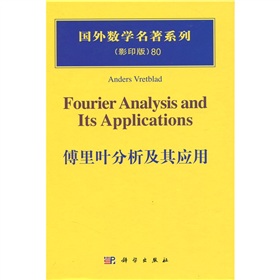傅里叶分析及其应用 电子书下载 PDF下载

内容简介
《傅里叶分析及其应用(影印版)》专著介绍了偏微分方程中用到的傅里叶分析及其应用的基本知识,作者以深入浅出的语言介绍此理论,即使基础知识较少的读者阅读此专著也不会觉得困难。其次,作者还介绍了更前沿的理论,例如,Gibbs现象,Sturm-Liouville定理,多维傅里叶分析等,而这些理论在其他此类专著中基本很难看到。而且此书中的一系列例题和习题可以帮助读者更好的理解书中的知识。
·查看全部>>
目录
Preface
1 Introduction
1.1 The classical partial differential equations
1.2 Well-posed problems
1.3 The one-dimensional wave equation
1.4 Fourier'S method
2 Preparations
2.1 Complex exponentials
2.2 Complex-valued functions of a real variable
2.3 Ceshro summation of series
2.4 Positive summation kernels
2.5 The Riemann-Lebesgue lemma
2.6*Some simple distributions
2.7*Computing with ?
3 Laplace and Z transforms
3.1 The Laplace transfclrm
3.2 Operations
3.3 Applications to differential equations
3.4 Convolution
3.5*Laplace transforms of distributions
3.6 The Z transform
3.7 Applications in control theory
Summary of Chapter 3
4 FDurier series
4.1 Definitions
4.2 Dirichlet'S and Fejdr'S kernels;uniqueness
4.3 Diffrentiable functions
4.4 Pointwise convergence
4.5 Formulae for other periods
4.6 Some worked examples
4.7 The Gibbs phenomenon
4.8 *F0urier series for distributions
Summary of Chapter 4
5 L2 Theory
5.1 Linear SlClaces over the complex numbers
5.2 Orthogonal projections
5.3 Some examples
5.4 Tlle F0urier system iS complete
5.5 Legendre polynomials
5.6 Other classical orthogonal polynomials
Summary of Chapter 5
6 Separation of variables
6.1 The solution 0f F0urier'S problem
6.2 Vaiations on Fourier'S theme
6.3 The Dirichlet problem in the unit disk
6.4 Sturm-Liouville problems
6.5 Some singular Sturm-Liouville problems
Summary of Chapter 6
7 F0urier transforms
7.1 Introduction
7.2 Definition of the Fourier transform
7.3 Properties
7.4 The inversion theorem
7.5 The convolution theorem
7.6 Plancherel'S formula
7.7 Application 1
7.8 Application 2
7.9 Application 3:The sampling theorem
7.10 木Connection with the Laplace transfocrm
7.1 1*Distributions and Fourier transforms
Summary of Chapter 7
1 Introduction
1.1 The classical partial differential equations
1.2 Well-posed problems
1.3 The one-dimensional wave equation
1.4 Fourier'S method
2 Preparations
2.1 Complex exponentials
2.2 Complex-valued functions of a real variable
2.3 Ceshro summation of series
2.4 Positive summation kernels
2.5 The Riemann-Lebesgue lemma
2.6*Some simple distributions
2.7*Computing with ?
3 Laplace and Z transforms
3.1 The Laplace transfclrm
3.2 Operations
3.3 Applications to differential equations
3.4 Convolution
3.5*Laplace transforms of distributions
3.6 The Z transform
3.7 Applications in control theory
Summary of Chapter 3
4 FDurier series
4.1 Definitions
4.2 Dirichlet'S and Fejdr'S kernels;uniqueness
4.3 Diffrentiable functions
4.4 Pointwise convergence
4.5 Formulae for other periods
4.6 Some worked examples
4.7 The Gibbs phenomenon
4.8 *F0urier series for distributions
Summary of Chapter 4
5 L2 Theory
5.1 Linear SlClaces over the complex numbers
5.2 Orthogonal projections
5.3 Some examples
5.4 Tlle F0urier system iS complete
5.5 Legendre polynomials
5.6 Other classical orthogonal polynomials
Summary of Chapter 5
6 Separation of variables
6.1 The solution 0f F0urier'S problem
6.2 Vaiations on Fourier'S theme
6.3 The Dirichlet problem in the unit disk
6.4 Sturm-Liouville problems
6.5 Some singular Sturm-Liouville problems
Summary of Chapter 6
7 F0urier transforms
7.1 Introduction
7.2 Definition of the Fourier transform
7.3 Properties
7.4 The inversion theorem
7.5 The convolution theorem
7.6 Plancherel'S formula
7.7 Application 1
7.8 Application 2
7.9 Application 3:The sampling theorem
7.10 木Connection with the Laplace transfocrm
7.1 1*Distributions and Fourier transforms
Summary of Chapter 7
同类热门电子书下载更多
Copyright © 2025 by topbester.com.
All Rights Reserved.
沪ICP备14027842号-1
All Rights Reserved.
沪ICP备14027842号-1